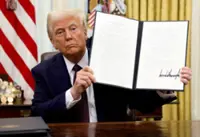
Trump extends deadline by 75 days, threatening tariffs on China if Beijing does not approve a deal regarding the app. — SCMP
On his first day in office, US President Donald Trump followed through on his campaign promise to delay a controversial TikTok divest-or-ban law by signing an executive order and warning that he would impose significant tariffs on China if Beijing failed to approve a deal regarding the app.
“I may not do the deal. I may do the deal. TikTok is worthless, worthless. If I don’t approve it, it has to close. I learned that from the people that own it,” Trump said on Monday.
“With TikTok, I have the right to either sell it or close it, and we’ll make that determination ... We may have to get an approval from China too, I’m not sure, but I’m sure they’ll approve it,” he added.
Trump went on to suggest that “if we wanted to make a deal with TikTok, and it was a good deal, and China wouldn’t approve it, then I think ultimately they’d approve it because we’d put tariffs on China”.
“Maybe, I’m not saying I would, but you certainly could do that. And if we said, well, ‘you’re not going to approve it’, then that’s a certain hostility, and we’ll put tariffs of 25, 30,40, 50%, even 100%.”
The executive order effectively buys time – 75 days – for the administration to explore alternative solutions to address the app’s data privacy concerns without resorting to an outright ban.
It also opens the door for further negotiations with ByteDance, TikTok’s Chinese parent company, in hopes of finding a resolution that satisfies national security requirements.
TikTok’s chief executive Chew Shou Zi was spotted next to Tulsi Gabbard, Trump’s pick for national intelligence director, during his swearing-in ceremony in the Capitol rotunda. Chew also met Trump at Mar-a-Lago, the president’s Florida resort, on December 16.
Last week, the US Supreme Court upheld a law requiring ByteDance to sell off TikTok to an American buyer or get banned. The law was passed in April by the US Congress and subsequently signed by former president Joe Biden.
On Saturday, TikTok shut down its services just ahead of a deadline that went into effect on Sunday requiring ByteDance to sell the app. The app came back online later on Sunday after Trump said he would sign an order to “confirm that there will be no liability for any company that helped keep TikTok from going dark before my order”.
Trump also proposed that an American buyer acquire 50 per cent of TikTok, turning it into a joint venture with its current Chinese owners, though that idea did not seem to address what had been a central national security concern: TikTok’s alleged obligation to share user data with Beijing.
“I would like the United States to have a 50 per cent ownership position in a joint venture,” Trump posted on his Truth Social account. “By doing this, we save TikTok, keep it in good hands and allow it to stay up. Without US approval, there is no TikTok. With our approval, it is worth hundreds of billions of dollars – maybe trillions.”
Responding to the post, Chinese foreign ministry spokeswoman Mao Ning told reporters in Beijing on Monday that “for such actions as corporate operations and acquisitions, we always believe that they should be decided independently by companies based on market principles”.
Ian Bremmer from strategic risk consultancy Eurasia Group, said the exchange indicated that China seems “willing to go either way: approve a sale or allow for TikTok’s closure”.
“TikTok isn’t a particularly strategic issue for the Chinese government. It’s primarily intended to be a digital commerce site, in line with the way Chinese companies and the Communist Party view the function of all social media – an area that is as yet underdeveloped from the Chinese perspective in the United States,” he said.
It also remains uncertain whether Trump’s proposed solution would satisfy members of Congress, including those within the Republican Party who have raised concerns about foreign control over such a widely used platform.
Republican Senators Tom Cotton of Arkansas and Pete Ricketts of Nebraska have spoken out against Trump’s TikTok relief plan.
“Now that the law has taken effect, there’s no legal basis for any kind of ‘extension’ of its effective date,” the two senators said in a statement posted to social media.
“For TikTok to come back online in the future, ByteDance must agree to a sale that satisfies the law’s qualified-divestiture requirements by severing all ties between TikTok and Communist China,” they added.
Throughout his campaign, Trump promised to “save” TikTok, in stark contrast to his position in his first presidential term.
In 2020, Trump raised the idea of banning TikTok if ByteDance did not sell it and issued an executive order to that effect, which was thrown out by a federal district court.
But he reversed his opposition last year after meeting with Jeff Yass, a billionaire Republican Party donor who is a leading investor in ByteDance. – South China Morning Post











































